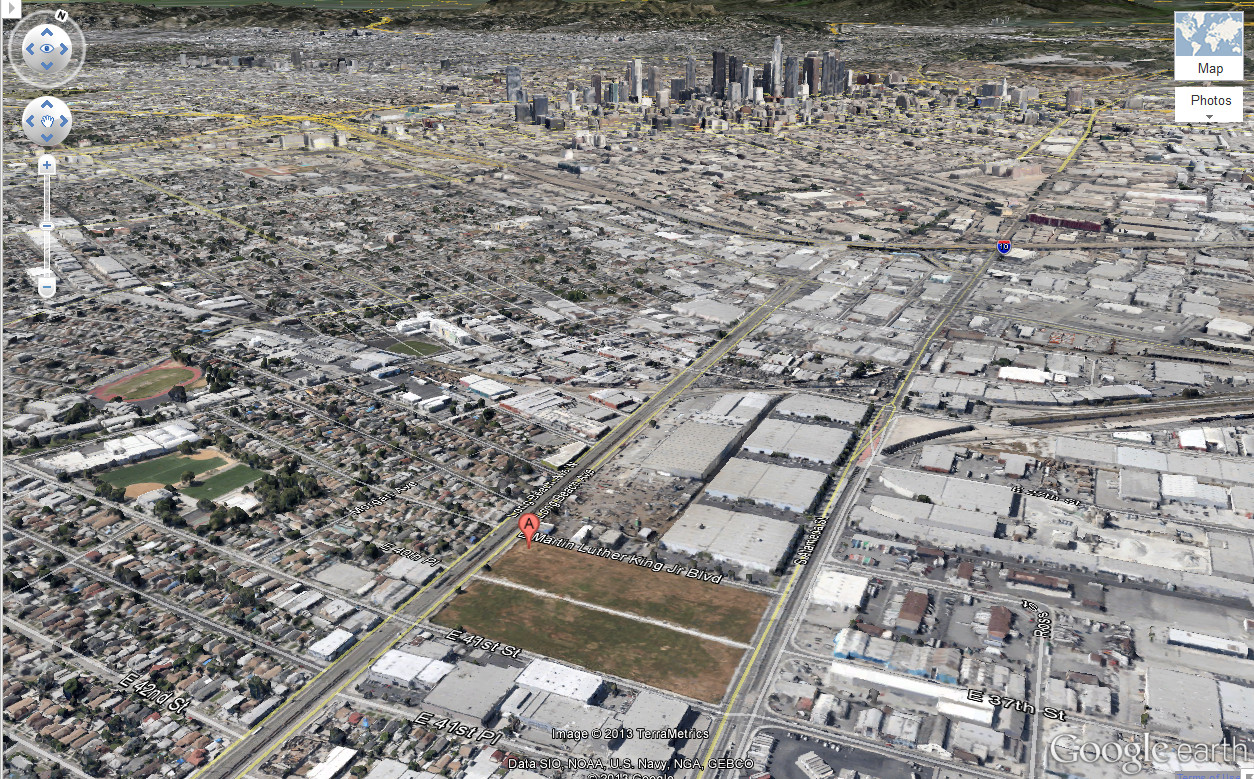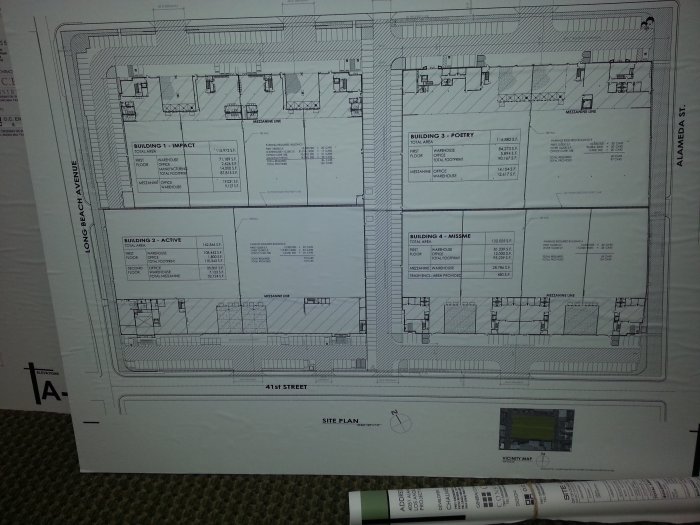
Source: www.google.com/maps
On June 26, 2013 the public comment came to a close on the future of the South Central Farmers' farm at 41st St. and Alameda ave in South Los Angeles. Under consideration is a massive 4 warehouses encompassing 14 acres. This piece of contested land is the largest piece of contiguous real estate in South Los Angeles.
On June 3rd, members of the community communicated with the South Central Farmers that there were new attempts to develop the land at 41st and Alameda -- the original site of the South Central Farm. On June 5, 2013 the city of Los Angeles would be considering approval of the "Mitigated Negative Declaration" (MND) as part of the California Environmental Quality Act (CEQA) process. (See the previous post.)
Proposed Warehouses:
Source: Tezozomoc 2013
The Paradox of Being Grown Out of Place
In 2006, the 350 families who comprised the South Central Farmers became an international symbol of the struggle between the people's right to raise and distribute healthy food for their families and neighbors, and the profits of developers in the over-industrialized food desert of South Los Angeles. Thousands of farm supporters from across the country joined celebrities like Julia Butterfly Hill, John Quigley, Daryl Hannah, Joan Baez, Willie Nelson, Ralph Nader, and Danny Glover to protest the city's sale of the farm for development. Letters of support poured in from as far away as Oaxaca and South Africa.
But in the early morning of June 13, 2006, after a 3-month encampment on the farm, the sheriff's deputies in SWAT gear and bulldozers arrived and razed two generations of work to reclaim and farm the land. Thousands of people poured into the low-income neighborhood and clutched the chain link fence around the farm or wept from across the street. They witnessed the sheriff's storm across the carefully crafted rows of herbs, cactus, and vegetables. The city forcibly removed protestors who had camped on the land and clung to platforms in tree branches in defiance of an eviction order. Forty-four were arrested. Television cameras from around the country recorded the destruction of nearly twenty years of family farming, and on the noonday news, millions watched as fire trucks uprooting trees and rolled across plots cultivated by parents and their children.
Since that tragic morning when the nation's largest urban farm was uprooted, the farmers have halted development on the farmland, turning back plans to sell the land to clothing giant Forever 21 with the threat of a national boycott. Alarmed residents and the South Central Farmers Support Committee collected thousands of signatures, packed a Planning Department meeting to overflowing, and testified for hours in opposition to the proposed development. The Planning Commission reluctantly reversed itself, requiring an Environmental Impact Report before construction for the shipping center could begin. That project was shelved. The farmers returned in 2011 to protest the city's plan to sell off a 2.7-acre parcel that had been promised as a park for area children to a conglomerate of small clothing manufacturers. The farm remains an international icon of low-income residents creating their own environmental justice.
The City's Antiquated Process:
While many of us who have participated in the simulation called constituent participation in LA politics are very familiar with the highly stylized and aesthetic procedure that community member are run through. The city as a whole is setup to "politically paw" the concerned constituents and all deals in the City of Los Angeles are back-roomed shopped and pre-paid by developers and their lackeys; the politicians and appointees. The staff of the politicians and the politicians are there to give you atole with their fingers, to quote a Mexican saying, "No Me Des Atole Con el Dedo (don't give me corn gruel with your finger; "Dar atole con el dedo: Significa embaucar, engañar, defraudar." to bamboozle, and defraud). The politicians and the developers have pre-scripted a narrative that passes the facade of legal and moral acceptability couched in the latest aspiration of the masses; in our case is the "Great American Job Scam."
To battle a pre-scripted rationality is met with challenges to the constituent rationality. Why can't the constituent see that the city and the job-creating developers will "care" for the constituent? Can't the constituent see that there is no other rationality more viable than what they have painted for the stakeholders? Casual agents for the City and the developer's will go to great lengths to hide the mechanics of power that grease the wheels of great deals in the City of Los Angeles. The city and developers privilege a "totality" only by means of the "state and finance nexus." The myth that this nexus is the optimal solution for society's ills and lack of full employment. This myth has been knocked and many marginalized communities have paid for the privileging of this "Kantian Totality."
The Paradox of Kantian Totality
The paradox of the Kantian totality is that in the claim for unity, something is always sacrificed. The benefit is optimized for the city politicians and the developers and the stakeholders suffer the residual that cannot be fully captured by the textual narratives of totality. When the community is sold this myth many real estate resources, taxes, and environments are sacrificed as the un-totalizable matter that escapes the Kantian Totality. We have seen this by the fact that our communities have the worst air pollution in the county, worst noise and traffic density, and quality of life.
2013 Chicano Scholar of the Year Writes Scathing opposition to the SCF Farm Development
Dr. Peña, who blogs at ejfood.blogspot.com, wrote what can only be considered a scathing rebuttal's to the City of Los Angeles attempt to approve a Mitigated Negative Declaration submitted by the four garment companies planning to put four warehouses at the previous site of the South Central Farmers.
Dr. Devon Peña (born 1954) is a Chicano professor of anthropology and ethnic studies and an activist in the environmental justice movement. Peña grew up on the U.S.-Mexico border in Laredo, Texas. He gained a Ph.D. in sociology from the University of Texas in Austin in 1983. His book, The Terror of the Machine: Technology, Work, Gender, and Ecology on the U.S.-Mexico Border, won the "1998 Outstanding Academic Book" award of Choice Magazine and the American Library Association. The book is a study of women workers and their struggles against capitalism and environmental destruction in the maquiladora industry of Juarez, Mexico. Since 1999, he has held an academic appointment as professor of anthropology and American ethnic studies at the University of Washington where he is affiliated with the graduate program in environmental anthropology. At the same time he is adjunct professor with women's studies, the Center for Water and Watershed Studies, Latin American studies, Program on the Environment, and the Institute for Public Health Genetics. At the same time he has been a public policy advocate and environmental justice activist. He also works on the family's historic acequia farm in San Acacio, Colorado.
According to goodfoodworld.com:
A pioneering interdisciplinary research scholar and widely-cited author, his most recent books include Mexican Americans and the Environment: Tierra y Vida (U. of Arizona Press, 2005) and The Oxford Encyclopedia of Latinos and Latinas in the United States (senior editor, Oxford University Press, 2005).
Dr. Peña is the Founder and President of The Acequia Institute, the nation's first Latina/o charitable foundation dedicated to supporting research and education for the environmental and food justice movements.
Dr. Peña highlights his concern with the process that the City of Los Angeles if following in this project: "I am objecting to the City of Los Angeles Planning Department's lack of a comprehensive Environmental Impact Study (EIS) and a Social Impact Assessment (SIA) for a proposed industrial building development at the site of the vacant land that was the South Central Farm."
Dr. Peña lays out why this site is important: "The Project contemplates the construction of a approximately 565,796 square feet of industrial buildings on the 10.04 acres of vacant land that was historically used as a community garden for residents of south central Los Angeles. These residents, mostly racial and ethnic minorities, suffer from a scarcity of open space and other environmental amenities that most middle-class Angelenos take for granted." Dr. Peña clearly states why the City of Los Angeles has not met the "Fair Standard", "The minimal impact threshold has not been met and the current IS and MND fails to adequately identify the full range of significant impacts emanating from the Industrial Project and further fails to mitigate those impacts to below significance. The MND is improper and also violates the spirit and intent of the federal and California Principles of Environmental Justice since this is a community that already faces disparate adverse impacts from industrial facilities, hazardous sites, and a lack of public open space."
Part 2 will cover environmental issues on the ground.
